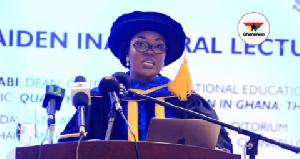 Professor Goski Alabi, Dean of the Centre for International Education and Collaboration, UPSA
Professor Goski Alabi, Dean of the Centre for International Education and Collaboration, UPSA
The country has placed too much emphasis on the lower levels of education at the expense of higher or tertiary education, which has led to the production of a semi-literate population, Professor Goski Alabi, Dean of the Centre for International Education and Collaboration (CIEC) at the ?University of Professional Studies, Accra (UPSA), has said.
“It is my considered opinion that overemphasising and focusing on the lower levels only perpetuates semi literacy and also somehow does not promote the needed employment creation for our people,” she said.
Speaking to the B&FT ahead of her inaugural lecture on the topic ‘Quality of Higher Education in Ghana; The Key Issues,’ which is slated for today, 4pm, at the UPSA auditorium, Professor Alabi noted that the country needs to prioritise higher education.
“Knowledge is generated to support a number of developmental issues and advancement but if we focus too much on primary and secondary education, what happens is that we are producing a lot of people who cannot really support the development of the economy the way it ought to be,” she said.
Even though Article 38(2) of the country’s constitution provides for free basic and secondary education, Prof. Goski Alabi, argues that without adequate provision for quality tertiary education could be detrimental to the future of the nation.
“As a country, we have focused a lot on the lower levels of education including the primary and secondary levels as is enshrined in our constitution but tertiary education needs a lot of attention from stakeholders,” she added.
Data from the National Council for Tertiary Education (NCTE) indicates that about 100,000 students graduate from the over 70 universities in the country annually, whilst data from the West African Examination Council (WAEC) shows that more than 400,000 students wrote the WASSCE exams in 2016.
This means only 25percent of SHS graduates gain admission to the university, which points to lack of absorption capacity for most of the over 70 universities spread across the country.
Quality tertiary education
As a Professor of Quality Management and Leadership, Professor Alabi’s lecture is going to be centred on the quality of higher education in Ghana.
“In my abstract, I will be asking a number of questions. We find ourselves using western textbooks and working theories and yet we expect that what we teach the students will be responsive in our context and solve the needs of our environment. It can’t work that way,” she said.
Education experts, Prof. Goski argues, need to interrogate these issues, saying her lecture will be looking at the issues from more of a quality point of view, and the role policy can play in ensuring same.
“I will be looking at what the situation is, how we are trying to manage quality of higher education in Ghana, what the strengthens are, the opportunities for improvement are, and some of the critical things we need to reconsider and review or pay attention to.”
Policy Advocacy
Professor Goski Alabi notes that, in her lecture, she will be advocating a number of policy measures, including governance reforms and reviews, to ensure that Ghana is able to support higher education in a way that can promote the kind of quality expected from it.
“When we talk about higher education we can look at it from two points of view: the quality assurance of it, which include the management of input, processes, output and outcomes; then we can look at it from how we manage the relevance, recognition, functionality and comparability. At the end of the day, it should work for us, because if it is not working for us, it is not quality,” she indicated.
“I will be making recommendations because there is the need for some revisions and reviews of our regulatory framework, for example. We need to look at what we consider as quality and whether it is working or not. I want to set the agenda to start some of these discussions,” she said.